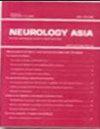eGFR 能否作为急性缺血性脑卒中血管内治疗的预后因素?
IF 0.2
4区 医学
Q4 CLINICAL NEUROLOGY
引用次数: 0
摘要
背景与目的:慢性肾脏病(CKD)与急性脑卒中患者死亡风险的增加有关。本研究旨在探讨慢性肾脏病与接受血管内治疗的急性缺血性卒中患者预后之间的潜在关联。研究方法对一家综合性卒中中心接受血管内治疗(EVT)的急性缺血性卒中患者进行回顾性研究。患者被分为术前 CKD 和非 CKD 两类。比较两组患者的人口统计学数据、手术数据和预后。结果:研究共涉及 140 名患者(69 名男性,49.3%),平均年龄(66.51±11.8)岁。CKD 组在最初 24 小时内出现症状性颅内出血和三个月内死亡率增加(50% vs. 19.8;P=0.001)。CKD组的优和良预后下降(25% 对 53.4;P=0.01;41.6% 对 56.9%;P=0.03)。对潜在混杂因素进行调整后的多元逻辑回归表明,CKD 与较低的优良预后率相关(几率比 [OR] = 0.50,95% 置信区间 [CI],0.25 至 0.80,p = 0.01)。80,P = 0.01)、更高的 mRS 评分(常见 OR = 1.82,95% CI,1.2 至 2.9,P = 0.01)、更高的死亡率(OR = 2.1,95% CI,1.2 至 4.2,P = 0.01)和 sICH(OR = 1.15,95% CI,1.03 至 3.4,P = 0.04) 结论:对于接受 EVT 治疗的急性缺血性卒中患者,CKD 与较差的治疗效果之间存在关联。存在 CKD 不应禁止患者接受 EVT,但将基线 eGFR 考虑在内可改善预后评估并有助于治疗方式的决策。本文章由计算机程序翻译,如有差异,请以英文原文为准。
Can eGFR be a prognostic factor for endovascular therapy for acute ischemic stroke?
Background & Objective: Chronic kidney disease (CKD) is associated with increased mortality risk in acute stroke patients. This study aims to investigate potential association between CKD and the prognosis of endovascular treated acute ischemic stroke patients. Methods: Patients with endovascular treatment (EVT) for acute ischemic stroke were studied retrospectively in a comprehensive stroke center. Patients were classified as pre-procedural CKD and non-CKD. The groups were compared regarding demographic data, procedural data, and outcomes. Results: A total of 140 patients (69 male, 49.3%) with a mean age of 66.51±11.8 were involved in the study. Symptomatic intracranial hemorrhage in the first 24 hours and mortality in three months were increased in the CKD group (50% vs. 19.8; p=0.001). Excellent and good outcomes were decreased in the CKD group (25% vs. 53.4; p=0.01 and 41.6% vs. 56.9%; p=0.03). Multiple logistic regression adjusted for potential confounders demonstrated that CKD was associated with lower rates of excellent outcome (odds ratio [OR] = 0.50, 95% confidence interval [CI], 0.25 to 0.80, p = 0.01), higher mRS scores (common OR = 1.82, 95% CI, 1.2 to 2.9, p = 0.01), and increased mortality (OR = 2.1, 95% CI, 1.2 to 4.2, p = 0.01) and sICH (OR = 1.15, 95% CI, 1.03 to 3.4, P = 0.04) Conclusion: There is an association between CKD and poorer results in patients with acute ischemic stroke treated with EVT. The presence of CKD should not prohibit patients from undergoing EVT, but taking baseline eGFR into account may improve estimation of prognosis and help decision-making in treatment modality.
求助全文
通过发布文献求助,成功后即可免费获取论文全文。
去求助
来源期刊

Neurology Asia
CLINICAL NEUROLOGY-
CiteScore
0.30
自引率
0.00%
发文量
76
审稿时长
>0 weeks
期刊介绍:
Neurology Asia (ISSN 1823-6138), previously known as Neurological Journal of South East Asia (ISSN 1394-780X), is the official journal of the ASEAN Neurological Association (ASNA), Asian & Oceanian Association of Neurology (AOAN), and the Asian & Oceanian Child Neurology Association. The primary purpose is to publish the results of study and research in neurology, with emphasis to neurological diseases occurring primarily in Asia, aspects of the diseases peculiar to Asia, and practices of neurology in Asia (Asian neurology).
 求助内容:
求助内容: 应助结果提醒方式:
应助结果提醒方式:


